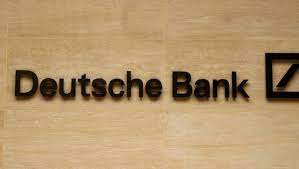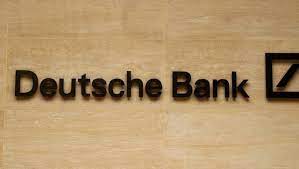
As the market panicked over the viability of the European banking system, shares of Deutsche Bank fell Friday and the cost of insurance against its default rose.
Many analysts, however, were baffled as to why the bank, which has reported a profit for 10 straight quarters and has excellent capital and solvency positions, had become the next target of a market that appeared to be in "seek and destroy" mode.
Investors are worried about a contagion effect following UBS's last-minute rescue of Credit Suisse after the collapse of Silicon Valley Bank in the United States. On Wednesday, the U.S. Federal Reserve tightened its monetary policy even more, adding to market anxiety.
The Credit Suisse rescue agreement, negotiated by Swiss authorities, was expected to assuage investor concerns about the soundness of Europe's banks, according to central banks and regulators.
However, the market was unconvinced that the deal would be adequate to contain the stresses in the sector after the collapse of the 167-year-old Swiss institution and the alteration of creditor hierarchy rules to wipe out 16 billion Swiss francs ($17.4 billion) of Credit Suisse's additional tier-one (AT1) bonds.
In recent years, Deutsche Bank conducted a multibillion-euro restructuring with the goal of lowering expenses and boosting profits. In 2022, the lender's annual net income increased by 159% to 5 billion euros ($5.4 billion).
At the end of 2022, its CET1 ratio—a gauge of bank solvency—was 13.4%, its liquidity coverage ratio was 142%, and its net stable funding ratio was 119%. These numbers do not suggest that the bank's solvency or liquidity position is under any threat.
Deutsche Bank has "completely reformed and modernized its business model and is a very lucrative bank," German Chancellor Olaf Scholz said during a news conference in Brussels on Friday. He added that there is no reason to speculate about the bank's future.
Concerns about Deutsche Bank have sometimes centered on its exposure to commercial real estate in the United States and sizable derivatives book.
Nevertheless, research company Autonomous, an affiliate of AllianceBernstein, downplayed these worries on Friday, citing the bank's "strong capital and liquidity positions" as being both "well known" and "simply not that alarming."
“Our Underperform rating on the stock is simply driven by our view that there are more attractive equity stories elsewhere in the sector (i.e. relative value),” Autonomous strategists Stuart Graham and Leona Li said in a research note.
“We have no concerns about Deutsche’s viability or asset marks. To be crystal clear - Deutsche is NOT the next Credit Suisse.”
They emphasized that Deutsche is "solidly profitable," in contrast to the struggling Swiss institution, and Autonomy projects a return on tangible book value of 7.1% for 2023 and an increase to 8.5% by 2025.
According to JPMorgan, a combination of three factors led to the collapse of Credit Suisse. The bank's reorganization effort was impeded by a difficult market environment, a "series of governance failings that had eroded confidence in management's competence," and the market's "new and concentrated focus on liquidity risk" following the SVB collapse.
Although the latter ultimately served as the catalyst, the Wall Street bank said that the climate in which Credit Suisse was attempting to change its business model was crucial and should not be undervalued, as demonstrated by a comparison with Deutsche.
“The German bank had its own share of headline pressure and governance fumbles, and in our view had a far lower quality franchise to begin with, which while significantly less levered today, still commands a relatively elevated cost base and has relied on its FICC (fixed income, currencies and commodities) trading franchise for organic capital generation and credit re-rating,” JPMorgan strategists said in a note Friday.
(Source:www.cnbc.com)
Many analysts, however, were baffled as to why the bank, which has reported a profit for 10 straight quarters and has excellent capital and solvency positions, had become the next target of a market that appeared to be in "seek and destroy" mode.
Investors are worried about a contagion effect following UBS's last-minute rescue of Credit Suisse after the collapse of Silicon Valley Bank in the United States. On Wednesday, the U.S. Federal Reserve tightened its monetary policy even more, adding to market anxiety.
The Credit Suisse rescue agreement, negotiated by Swiss authorities, was expected to assuage investor concerns about the soundness of Europe's banks, according to central banks and regulators.
However, the market was unconvinced that the deal would be adequate to contain the stresses in the sector after the collapse of the 167-year-old Swiss institution and the alteration of creditor hierarchy rules to wipe out 16 billion Swiss francs ($17.4 billion) of Credit Suisse's additional tier-one (AT1) bonds.
In recent years, Deutsche Bank conducted a multibillion-euro restructuring with the goal of lowering expenses and boosting profits. In 2022, the lender's annual net income increased by 159% to 5 billion euros ($5.4 billion).
At the end of 2022, its CET1 ratio—a gauge of bank solvency—was 13.4%, its liquidity coverage ratio was 142%, and its net stable funding ratio was 119%. These numbers do not suggest that the bank's solvency or liquidity position is under any threat.
Deutsche Bank has "completely reformed and modernized its business model and is a very lucrative bank," German Chancellor Olaf Scholz said during a news conference in Brussels on Friday. He added that there is no reason to speculate about the bank's future.
Concerns about Deutsche Bank have sometimes centered on its exposure to commercial real estate in the United States and sizable derivatives book.
Nevertheless, research company Autonomous, an affiliate of AllianceBernstein, downplayed these worries on Friday, citing the bank's "strong capital and liquidity positions" as being both "well known" and "simply not that alarming."
“Our Underperform rating on the stock is simply driven by our view that there are more attractive equity stories elsewhere in the sector (i.e. relative value),” Autonomous strategists Stuart Graham and Leona Li said in a research note.
“We have no concerns about Deutsche’s viability or asset marks. To be crystal clear - Deutsche is NOT the next Credit Suisse.”
They emphasized that Deutsche is "solidly profitable," in contrast to the struggling Swiss institution, and Autonomy projects a return on tangible book value of 7.1% for 2023 and an increase to 8.5% by 2025.
According to JPMorgan, a combination of three factors led to the collapse of Credit Suisse. The bank's reorganization effort was impeded by a difficult market environment, a "series of governance failings that had eroded confidence in management's competence," and the market's "new and concentrated focus on liquidity risk" following the SVB collapse.
Although the latter ultimately served as the catalyst, the Wall Street bank said that the climate in which Credit Suisse was attempting to change its business model was crucial and should not be undervalued, as demonstrated by a comparison with Deutsche.
“The German bank had its own share of headline pressure and governance fumbles, and in our view had a far lower quality franchise to begin with, which while significantly less levered today, still commands a relatively elevated cost base and has relied on its FICC (fixed income, currencies and commodities) trading franchise for organic capital generation and credit re-rating,” JPMorgan strategists said in a note Friday.
(Source:www.cnbc.com)














